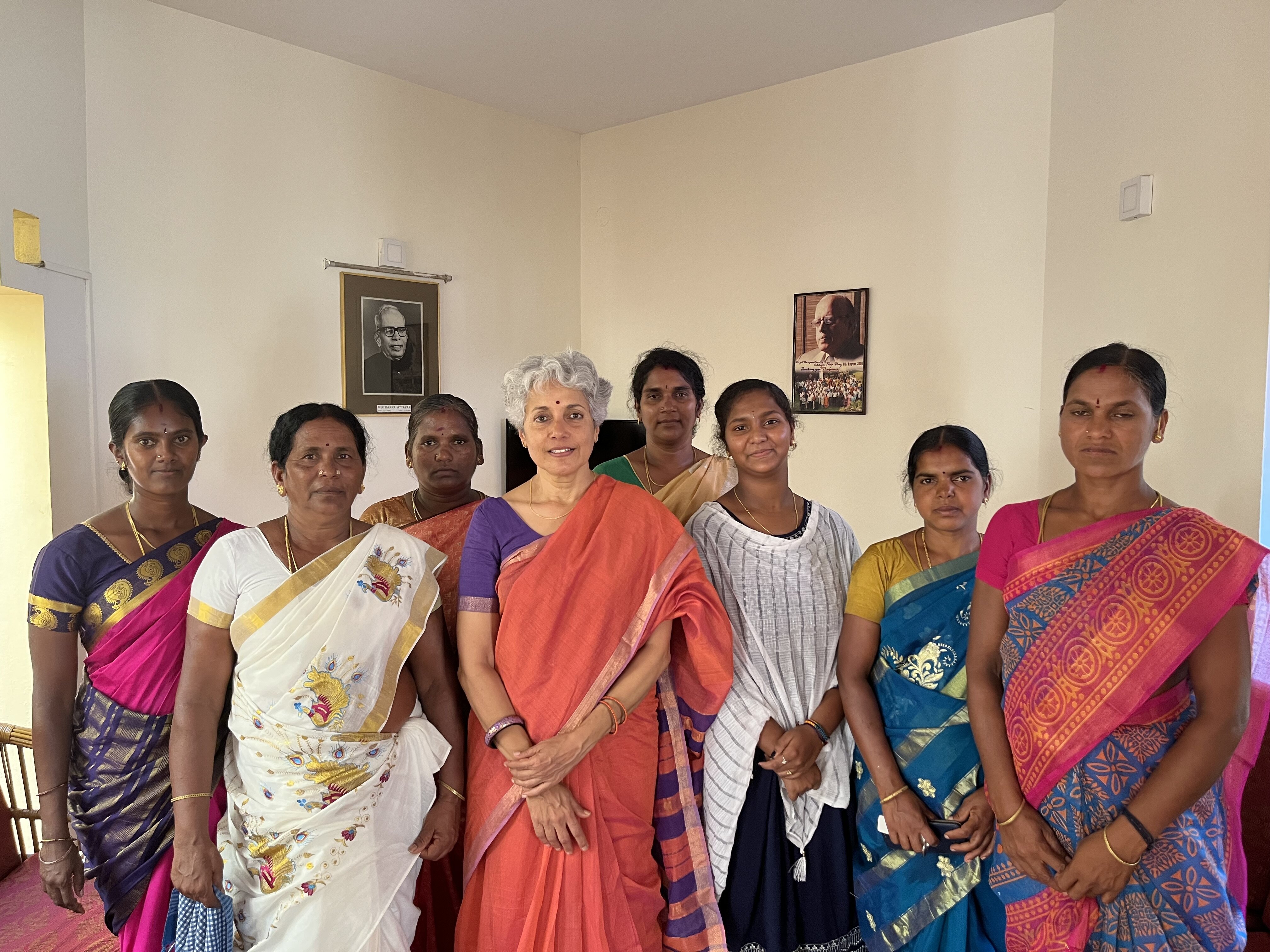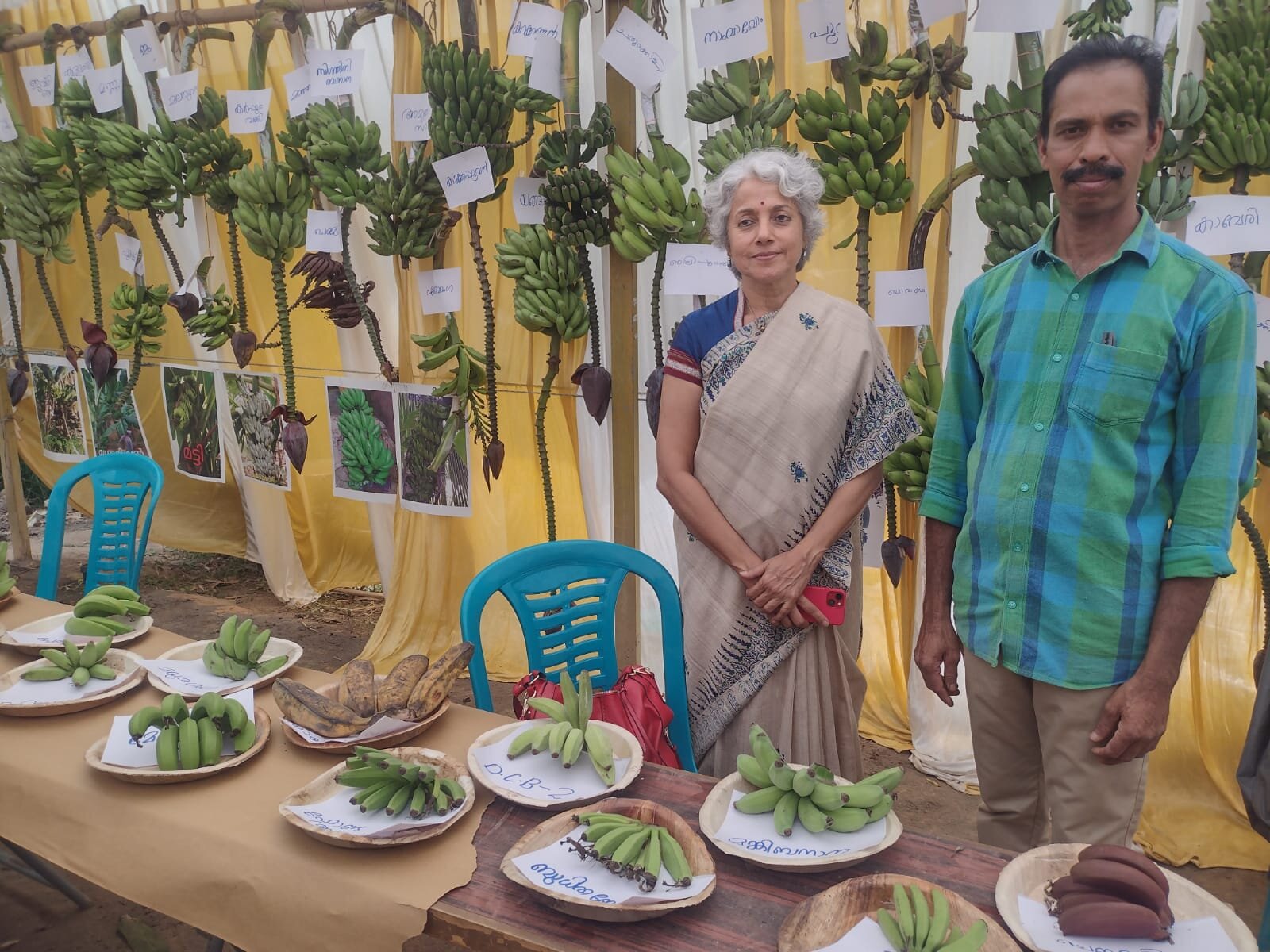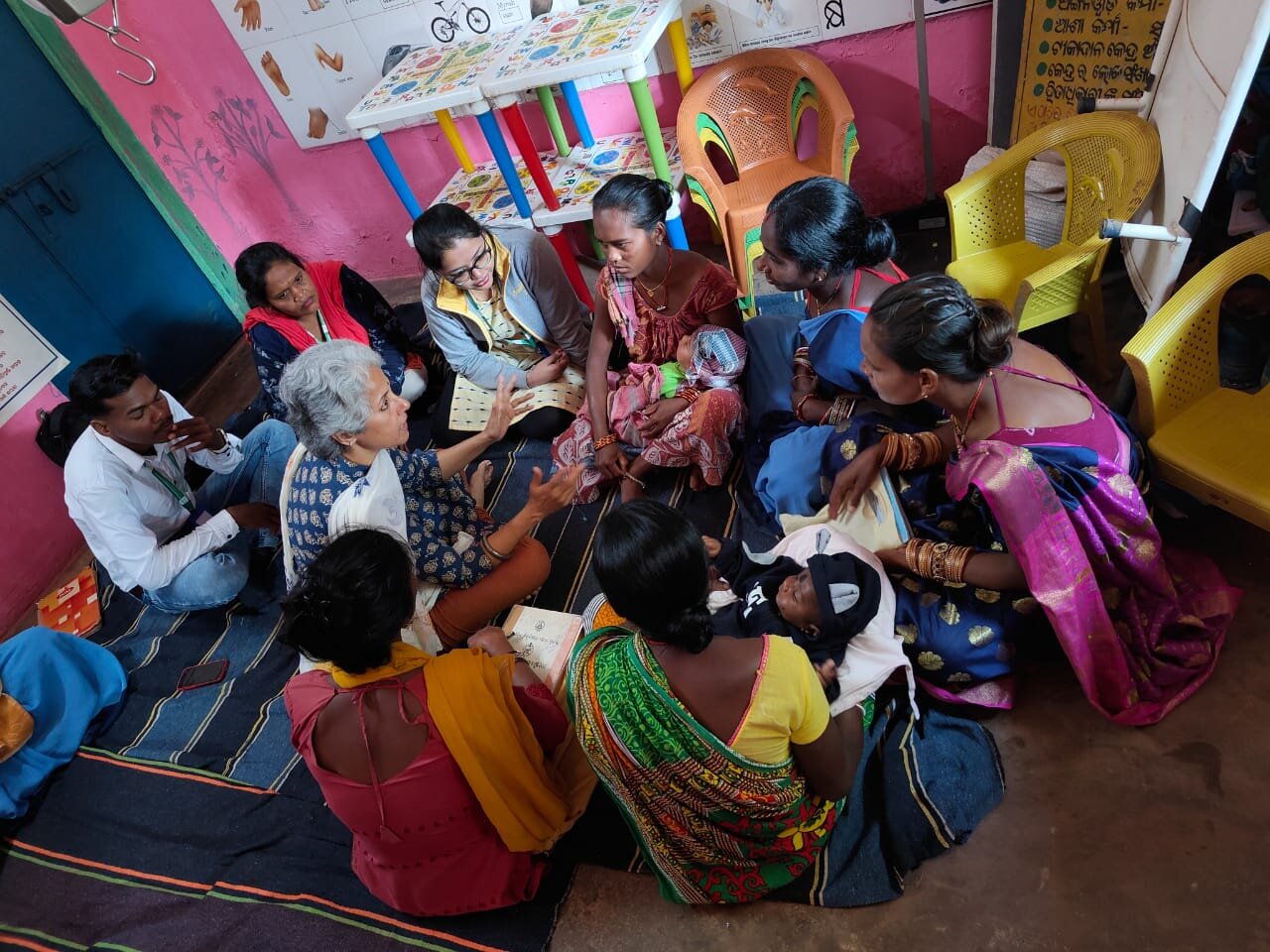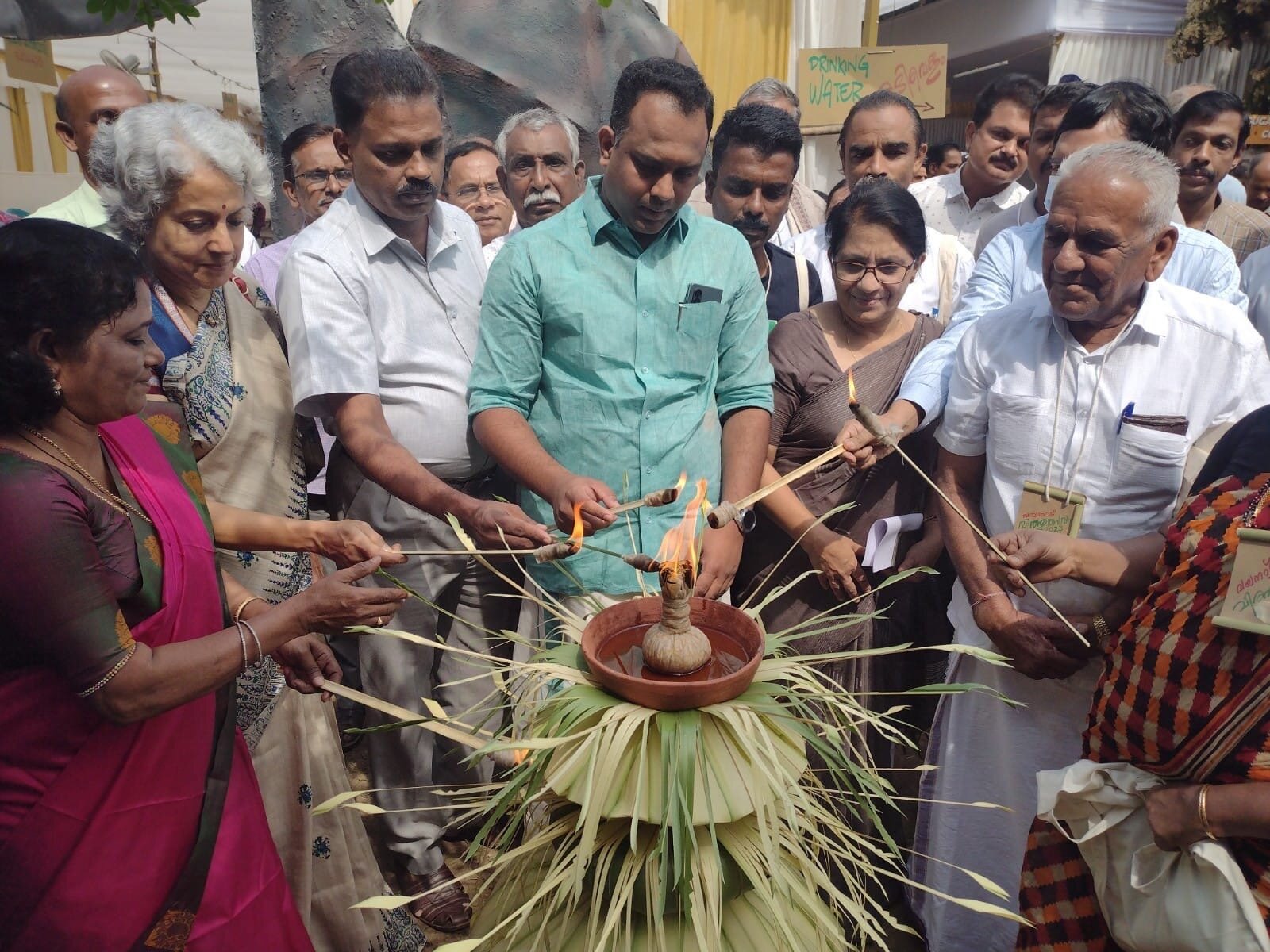af Magazine
~The Asahi Glass Foundation’s web magazine on the global environment~


36 Years of the M S Swaminathan Research Foundation (MSSRF): Engaging in Community-Based Sustainable Development for Healthy Natural Environment and People's Lives
The M S Swaminathan Research Foundation (MSSRF) paved the way for sustainable agriculture and rural development in India, and in 1996 it became the first Blue Planet Prize recipient from Asia. Since its inception 36 years ago, MSSRF's initiatives have achieved significant successes in India's rural areas and are recognized as exemplary by the Indian government and globally. In 2023, Dr. Soumya Swaminathan succeeded her father, Dr. Monkombu Sambasivan Swaminathan, as the Chairperson of the foundation. In an interview conducted on July 5, 2024, Dr. Soumya Swaminathan discussed the activities of MSSRF and shared her vision for the organization's future.
Our Vision: Bridging Science and Society through Equitable and Sustainable Development

The M S Swaminathan Research Foundation (MSSRF) was established in 1988 by Dr. Monkombu Sambasivan Swaminathan, the father of Dr. Soumya Swaminathan. Dr. M.S. Swaminathan, an agricultural scientist, was the scientific leader in the ever-green revolution movement in the mid-1960s, which aimed to alleviate hunger in India. He successfully developed high-yielding varieties of rice and wheat, leading to significant improvements in India's food security. In recognition of his outstanding contributions to addressing global hunger, Dr. M.S. Swaminathan was awarded the first World Food Prize in 1987.
"The ever-green revolution was undoubtedly a necessary step at the time, as widespread hunger plagued the nation and population growth was projected to continue at an increasing rate. It contributed to food security and reduced food imports by introducing high-yielding rice and wheat varieties. The green revolution also promoted modern agriculture, which involved the improvement of rice and wheat varieties; however it also employed large amounts of pesticides, chemical fertilizers, and water. My father, Dr. M.S. Swaminathan, believed that this approach lacked sustainability in the long term, and that climate change was an additional threat. Consequently, he established this research foundation, utilizing the prize money from the World Food Prize, to explore sustainable agricultural practices in India," explained Soumya when asked about the foundation's beginnings.
The MSSRF has been working to build, demonstrate, and disseminate models of sustainable development that are beneficial both to the environment and to people. Dr. M.S. Swaminathan termed these sustainability-driven technologies as "ecotechnology." During a lecture in Japan upon receiving the Blue Planet Prize in 1996, he described eco-technologies as follows:
"Ecotechnology means at least three E-words: ecology, economics, and equity. Without economic viability, the technology will not take off. Without ecological sustainability, the gains will be very short-lived. And without equity, both in gender and economic terms, we will find that the world will not be a happy place. There will be more and more social disintegration and the rich-poor divide will increase. So ecotechnologies are those which can combine some of these characteristics, particularly environmental soundness with economic viability."
(Source: "Ecotechnology and Sustainable Food Security," from a lecture in Japan upon receiving the Blue Planet Prize in 1996)
Sustainable Development: Striking a Balance between Preserving Nature's Abundance and Enhancing Local Lives

The MSSRF has made significant contributions to the world, and Soumya highlighted three notable achievements:
As a significant early achievement, she highlighted the conservation of mangrove ecosystems. Mangroves, which thrive in the brackish waters at the confluence of rivers and seas, possess unique adaptations to salinity and play a crucial role as a buffer zone between land and sea. However, since the 1980s, mangrove forests have been rapidly disappearing due to human activity. Recognizing the critical importance of mangrove ecosystems even before widespread awareness, the MSSRF initiated a conservation program along India's eastern coast in the 1990s. The results became clear in 2005 when a devastating tsunami struck India. The conserved mangroves acted as a natural barrier, significantly reducing the death toll in villages that were protected by mangrove forests, along India's eastern coast.
Next, Soumya elaborated on the MSSRF's achievements in conserving biodiversity in rural India. She explained the foundation's approach to sustainable biodiversity conservation as follows.
"In India, lands rich in biodiversity often tend to be areas inhabited by indigenous (tribal) communities (sometimes living in villages) with low incomes. For example, when the government starts biodiversity conservation activities on such land, it often leads to the displacement of local people and deprives them of their means of livelihood. Instead, it is crucial to establish systems that ensure people can benefit from conserving biodiversity. Environmental conservation that integrates conservation, cultivation, trade, and consumption, providing benefits to the community, is the essence of sustainability. This is my father's teaching and a core value of our foundation."
Recognizing the alarming decline in the diversity of cultivated crop varieties in India, MSSRF took action to establish a community seed bank system. India, a country rich in indigenous varieties of rice, millet, vegetables, and other crops, originally grew around 5,000 different species across the regions. However, the advent of modern agriculture and commercialization led to a drastic reduction in this diversity, with the number of different cultivated crops dwindling to around 10. To ensure agricultural biodiversity, the MSSRF launched a community seed bank system.
Managed by local communities, these seed banks operate on a unique system. After each harvest, farmers deposit a portion of their seeds into the seed bank. The following year, they can freely access these seeds when needed. For every 1 kg of seeds received, farmers return 2 kg of their harvest as interest. This ingenious system ensures that farmers have access to locally adapted crop varieties at no cost. Drawing inspiration from its remarkable achievements, the Indian government is now planning to scale up this initiative and implement it across the entire country.
Soumya elaborated further, "My father always emphasized that agricultural diversity is directly linked to people's nutritional status. To live healthily, humans need to consume a variety of micronutrients from a diverse range of grains and vegetables. Therefore, we also established community and household kitchen gardens in villages and provided opportunities for motivated community members to learn about nutrition and balanced diets. Through the community kitchen gardens, we have been promoting the importance of incorporating local ingredients into meals and encouraged all community residents to consume a variety of essential micronutrients."
Empowering women to create a brighter future for the community

Highlighting another remarkable achievement of MSSRF, Soumya further elaborated on the "Biovillage program and empowerment of women." The biovillage program is a human-centered developmental framework, which helps in blending modern technologies with traditional wisdom to nurture sustainable livelihoods. This initiative began in the early 1990s. For example, instead of using chemical fertilizers that harm the environment, compost made from cow dung and with the assistance of earthworms is produced and used in the fields.
The MSSRF has a policy of incorporating gender equality initiatives into all of its programs, and the biovillage program is no exception.
"Gender inequality remains a pressing issue in many countries today. Patriarchy is a deeply ingrained social norm, making it particularly challenging to address. Change must originate from within communities. Women have long been involved in agriculture, yet land ownership and access to bank loans are typically in men's names, perpetuating men's dominance. We have collaborated with women's groups to empower them, helping them build confidence and providing opportunities to gain knowledge to improve their skills. This is an activity I have been passionately involved with for a long time," Soumya explains.
Soumya emphasizes that empowering these groups of women significantly contributes to advancing the program and raising the overall income levels of the village.
She continues, "It is noteworthy that women's collective efforts have led to numerous successful initiatives. I believe the key lies in women coming together and pursuing endeavors they deem important. For instance, when women receive education, they can provide better care for their children, directly improving the children's health and nutritional status. Solutions based solely on external advice and directives lack sustainability. Empowering local women with knowledge, resources and tools and enabling them to take ownership leads to sustainable initiatives."
Prioritizing Climate Action and Strengthening Activities to Save Lives

Even after 36 years since its inception, Soumya reaffirms the organization's commitment to its three-pronged approach of ensuring food, economic, and ecological security, while simultaneously empowering women. She envisions expanding to other regions that will amount to five times the impact, over the next 6-7 years. As part of future development, Soumya mentioned introducing digital technologies (including AI) and biotechnology (tools), including gene editing, collaborating with other organizations, and offering solutions to address climate change.
"Throughout many of our programs, we were involved in addressing climate change issues. Since taking over as Chairperson of the MSSRF in February 2023, I have further expanded our climate change and health-related initiatives. Being a physician myself, I am deeply aware that climate change is a life-threatening issue. Recently, many people in India have lost their lives due to heatwaves, and others have been affected by floods and storms, losing their lives or livelihoods. It is the most vulnerable, the poor, who bear the brunt of these impacts," Soumya explained.
The MSSRF plans to collaborate with partner organizations across India to implement climate change solutions for communities and individuals. The organization will leverage research findings to drive technological advancements, such as developing an early heatwave warning system, which is accessible through a mobile app, and sending alerts urging those at risk of heatstroke to seek medical attention. Additionally, Soumya intends to create water storage systems within communities and set up cooling centers for people to escape heat stress.
In conclusion, Dr. Somaya has a message for the younger generation:
"The younger generation has the power to change the status quo. There are two ways to do this. First, keep putting pressure on local and national governments and elect governments that will do the right thing for the planet. Second, take action and contribute as individuals. Every individual can reduce their carbon footprint. This is especially important in developed countries, which consume a lot of energy. People in high income countries consume 10 to 20 times more energy than those in developing countries. I believe that if everyone reduces their carbon dioxide emissions today, it can significantly reduce global warming and change our future world.
This is an era where we can unite through social media. It is crucial for the sake of the planet that we act as one human species, undivided by religion or borders. I feel that the younger generation is already transcending these artificial divisions. I look forward to everyone's actions as members of the global village."
As for Soumya herself, she makes a conscious effort to walk and cycle as much as possible when she goes out, instead of taking her car. She said that she also walked a lot when she visited Japan recently. She believes that by changing our own behavior and influencing those around us, as well as politicians, we can change the future. Her powerful words, rooted in the history of MSSRF, which has brought about numerous changes in India, illuminate the path we should take.
Profile
Dr. Soumya Swaminathan
Chairperson of M S Swaminathan Research Foundation (MSSRF)
MSSRF is one of the 1996 Blue Planet Prize recipients.
Dr. Soumya Swaminathan, a pediatrician from India and a globally recognized researcher on tuberculosis and HIV, brings 40 years of experience in clinical care and research. She served as Secretary to the Government of India for Health Research and Director General of the Indian Council of Medical Research from 2015 to 2017 and Director of the National Institute for Research in Tuberculosis before that. From 2009 to 2011, she also held the position of Coordinator for the UNICEF/UNDP/World Bank/WHO Special Program for Research and Training in Tropical Diseases, which is in Geneva.
Dr. Swaminathan has received several honorary doctorates, including those from McGill University, Karolinska Institute, École Polytechnique Fédérale de Lausanne (EPFL), and the London School of Hygiene & Tropical Medicine (LSHTM). She serves on several national and global advisory bodies and committees. She is an Adjunct Professor at Karolinska University in Sweden and Tufts University in Boston, USA. Dr. Swaminathan most recently served as the Chief Scientist and, before that, Deputy Director-General for Programmes at WHO. In December 2022, she returned to India and soon took over as Chairperson of the M S Swaminathan Research Foundation (MSSRF).

